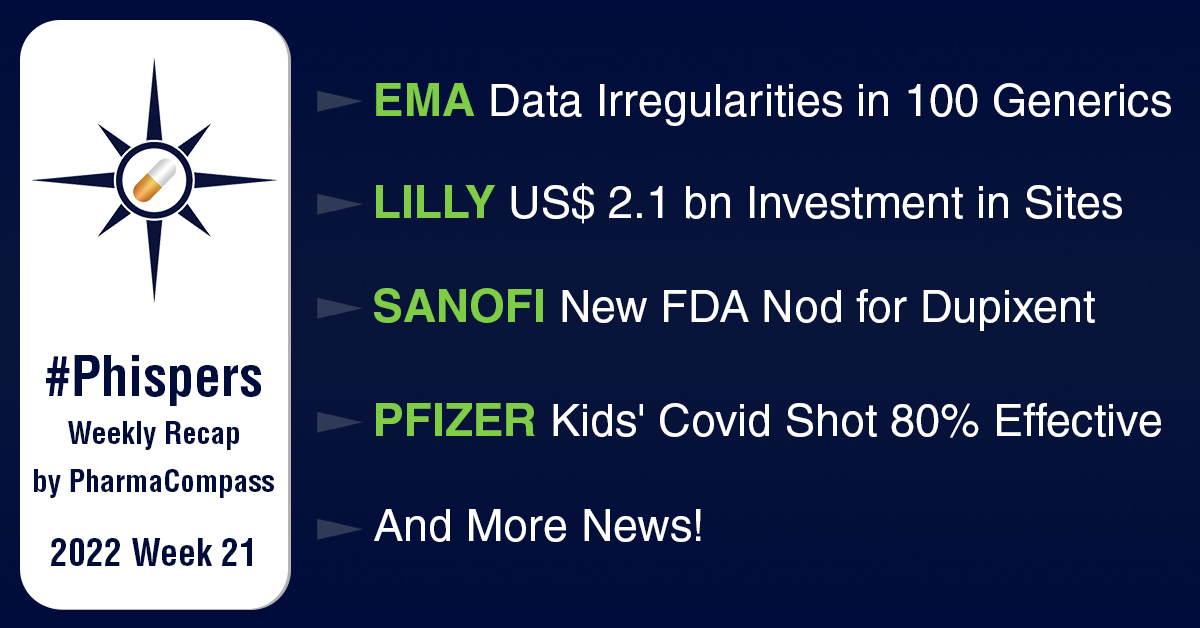
By PharmaCompass
2022-05-26
Impressions: 1,743
In Phispers this week, the European Medicines Agency (EMA) recommended the suspension of around 100 generic medicines that were tested by an Indian contract research organization (CRO) – Synchron Research Services – citing data integrity issues.
Eli Lilly said it will expand manufacturing at its Indianapolis home by investing US$ 2.1 billion in two new sites in Boone County.
Sanofi and Regeneron’s blockbuster drug Dupixent (dupilumab) has received a nod from the US Food and Drug Administration (FDA) to treat eosinophilic esophagitis (EoE). This is the first and only medicine to treat the disease.
Pfizer has said three doses of its Covid-19 vaccine – Comirnaty – generated a strong immune response in children under the age of five years. The drugmaker plans to expand its largest manufacturing site, located in Kalamazoo, Michigan, to support the rollout of its Covid-19 drug Paxlovid. Pfizer has also said it will make all its patented medicines available at a not-for-profit price to 45 of the world’s poorest countries.
As cases of monkeypox continue to rise around the world, countries and pharmaceutical companies are stepping up efforts to combat the disease. While the US is releasing some Jynneos vaccine doses from its stockpile, Roche has said it has developed three test kits to detect the monkeypox virus.
The UK health authorities have granted a marketing license to Teva’s Ongavia, a biosimilar to Roche’s wet age-related macular degeneration (AMD) medication Lucentis (ranibizumab). And Sun Pharmaceutical has recalled 10,500 bottles of a generic drug meant to treat depressive disorders after a customer complaint. Earlier this month, Sun’s facility in Gujarat, India, had received FDA’s Form 483.
Europe to suspend 100 generics after EMA finds data irregularities at Indian CRO
The European Medicines Agency (EMA) has recommended the suspension of around 100 generic medicines that were tested by an Indian contract research organization (CRO) citing data integrity issues.
The agency found irregularities in how the CRO – Ahmedabad-based Synchron Research Services – carried out the bioequivalence studies of the generic drugs. A bioequivalence study shows that a generic medicine releases the same amount of an active pharmaceutical ingredient (API) in the patient’s body as the reference medicine.
Companies with affected generic drugs include J&J, Sandoz, Viatris and Teva. EMA has asked the drugmakers to repeat their bioequivalence studies at an acceptable alternate study site.
Synchron has come under fire from regulatory agencies in the past too. The US Food and Drug Administration (FDA) had found several instances of misconduct and violation of federal regulations in bioanalytical studies conducted by Synchron in September 2021.
In the past, the FDA and EMA have also raised similar concerns regarding data findings from several other India-based CROs, including Semler Research and GVK Biosciences.
Sanofi’s Dupixent becomes first treatment for eosinophilic esophagitis in US
Sanofi and Regeneron’s blockbuster drug Dupixent (dupilumab) has bagged an FDA approval to treat eosinophilic esophagitis (EoE) – becoming the first and only medicine to treat the condition. EoE is an inflammatory disease that damages the esophagus and makes it hard for patients to swallow food or sip water. The disease affects more than 160,000 patients in the US.
The FDA has approved the drug to treat patients aged 12 years and older. In a phase 3 study, a 300 mg dose of the weekly Dupixent “significantly” improved the condition of around 64 percent of the patients over those assigned a placebo by week 24, Sanofi said.
A trial for the treatment in children between one and 11 years is underway, and the results are expected in a few months. Dupixent’s regulatory filing for EoE is under review by the EMA.
The drug generated US$ 5.8 billion (€5.25 billion) in sales last year, accounting for 13.9 percent of the pharma’s revenue in 2021.
Rare disease drug bags EMA authorization: In March, Japan granted marketing authorization to Xenpozyme (olipudase alfa), Sanofi’s drug for the treatment of adult and pediatric patients with non-central nervous system (non-CNS) manifestations of acid sphingomyelinase deficiency (ASMD) – a rare, progressive and potentially life-threatening genetic disease. Now, the EMA has authorized the drug to treat non-central nervous system manifestations of ASMD, also known as Niemann-Pick disease. Xenpozyme has become the only approved therapy for ASMD in Europe. The nod came after the drug showed improved lung function and a reduction in the swelling of the spleen and liver in two trials.
EMA recommends gene therapy treatment for rare disease: The European regulatory agency has recommended the approval of PTC Therapeutics’ one-time gene therapy Upstaza as a treatment for aromatic L-amino acid decarboxylase (AADC) deficiency patients who are 18 months and older. Upstaza will be the first approved treatment for AADC deficiency, and the first marketed gene therapy directly infused into the brain. AADC deficiency is a very rare genetic disease where patients cannot produce some hormones in the brain, leading to developmental delays, inability to control the movement of limbs and multiple organ failure.
Lilly to expand manufacturing in Indiana by investing US$ 2.1 billion
Eli Lilly plans to expand its manufacturing footprint in its home in Indianapolis by investing US$ 2.1 billion in two new manufacturing sites at Indiana’s LEAP Lebanon Innovation and Research District in Boone County.
According to a press statement, the two new facilities will expand Lilly’s manufacturing network for APIs and new therapeutic modalities, including genetic medicines.
According to Dave Ricks, CEO and president of Eli Lilly, the project is expected to result in 500 high-paying jobs. Around 1,500 construction jobs will be created while the facilities are being built.
“These new sites will add capacity in support of our growing pipeline of innovative medicines, while also creating more high-tech jobs for Hoosiers. We are pleased to be a founding investor at the LEAP Lebanon Innovation District,” Ricks said. In a statement, the Boone County Commissioners said Lilly would like to begin construction in the first quarter of 2023.
Of late, Lilly has been on a construction spree. In January, it announced a US$ 446 million expansion of API and monoclonal antibody production in Limerick, Ireland, and kicked off a US$ 1 billion project that will focus on injectables and medical devices in Concord, NC.
Pfizer’s three-dose Covid-19 shot is 80 percent effective in kids under five
Pfizer and its partner BioNTech said three doses of their Covid-19 vaccine – Comirnaty – generated a strong immune response in children under the age of five years. The vaccine makers said early data for their booster shot showed an 80.3 percent efficacy in the youngest age group.
The clinical trial involved 1,678 children between six months to under five years who were administered one-tenth of the dose meant for adults at a time when the Omicron variant was at its peak. The three doses generated a similar immune response to that in adults between 16- to 25-year-olds who received two shots of 30-microgram each.
The trial participants received their third dose two months after their second shot. Most side effects were mild or moderate, Pfizer said. The companies plan to complete their data submission to the FDA this week.
Meanwhile, Pfizer plans to expand its largest manufacturing site, located in Kalamazoo, Michigan, to support the rollout of Covid-19 drug Paxlovid. The expansion will create hundreds of “highly-skilled” jobs, local news reports said. The drugmaker plans to give out details on the expansion in early June, a Pfizer spokesperson said. The Kalamazoo site produces over 150 products that are shipped to 113 countries around the world.
Pfizer has also said it will make all its patented drugs including Covid-19 treatment Paxlovid and its breast cancer drug Ibrance available at a not-for-profit price to 45 of the world's poorest countries.
Teva’s Ongavia, first biosimilar to challenge Roche’s Lucentis, bags UK approval
The UK Medicines and Healthcare Regulatory Agency (MHRA) has granted a marketing license to Teva’s Ongavia – a biosimilar to Roche’s wet age-related macular degeneration (AMD) medication Lucentis (ranibizumab).
The license will make Ongavia the first biosimilar to challenge Lucentis, ahead of Samsung Bioepis’ Byooviz in the US and Europe. Ongavia has also been authorized to treat eye conditions such as diabetic macular oedema and proliferative diabetic retinopathy. Lucentis’ sales reached CHF 256 million (around US$ 266 million) in the US during the first quarter of 2022.
Shuttered California facility may trigger drug shortages: In October 2021, Teva had halted production at its sterile injectables manufacturing site in Irvine, California, due to FDA concerns about contamination issues at the facility. Around 2.5 million vials of drugs used to treat cancer, arthritis and schizophrenia among others, had been recalled earlier that year due to the contamination issue.
Now, a report by the End Drug Shortages Alliance (EDSA), a collaboration of healthcare industry stakeholders, said shuttering of the facility may create shortages of up to 24 generic sterile injectable drugs. Medicines to treat cancer, adult and pediatric diabetes and pancreatic neuroendocrine tumors are mostly susceptible to shortages, the report said. The group has urged drug manufactures to boost production of the affected drugs.
US to release Jynneos shots to combat monkeypox; Roche develops test kits
As cases of monkeypox continue to rise, countries and pharmaceutical companies are stepping up efforts to combat the disease. According to the WHO, there have been over 200 suspected or confirmed cases of monkeypox in Europe and North America.
Monkeypox is an infectious disease that can cause a severe rash, fever, headache, muscle aches and swollen lymph nodes. Smallpox vaccines like Bavarian Nordic’s Jynneos are at least 85 percent effective at preventing monkeypox, according to the Centers for Disease Control and Prevention (CDC), America’s public health agency.
US health officials are releasing some Jynneos vaccine doses from its stockpile for use in monkeypox cases. The Jynneos vaccine is manufactured by Danish company Bavarian Nordic. It was approved in the US in 2019 for use against smallpox and monkeypox in high-risk adults aged 18 and older.
The US government agency Biomedical Advanced Research and Development Authority (BARDA) has exercised a US$ 119 million option to manufacture freeze-dried doses of Jynneos in 2023 and 2024 to replace the current stock. It’s part of a US$ 299 million deal to replace the existing vaccine with a newer version.
Hundred million doses of an older smallpox vaccine, previously produced by Sanofi and now made by Emergent BioSolutions, is in the US stockpile.
Meanwhile, Bavarian Nordic has raised its sales outlook and now expects to post a smaller operating loss this year after signing a contract with an undisclosed country for the supply of its monkeypox vaccine.
Roche has said it has developed three test kits to detect the monkeypox virus. The first kit detects orthopoxviruses, the biological grouping which includes viruses associated with monkeypox as well as smallpox and cowpox. The second test kit detects only monkeypox viruses, specifically the West African and Central African strains. The third is for researchers and detects both orthopoxviruses and the monkeypox virus.
Germany has said it was assessing options for vaccinations, while Britain has offered shots to some healthcare workers. After success of its Covid-19 messenger RNA vaccine, Moderna has said it is exploring potential vaccines for monkeypox at a "preclinical level”.
Sun Pharma recalls 10,500 bottles of generic anti-depressant in US after complaint
Earlier this month, the FDA had issued a Form 483 with 10 observations to Sun Pharmaceutical’s Halol manufacturing plant in Gujarat, India. Now, the drugmaker has announced a recall of around 10,500 bottles in the US of a generic drug meant to treat major depressive disorders. The antidepressant was manufactured at the Halol facility.
According to the FDA, the US arm of the pharma is recalling 10,548 bottles of bupropion hydrochloride extended-release tablets following a customer complaint. The company recalled the affected lot due to the “presence of foreign substance”. The complainant had found a dark, gritty substance in a bottle, which has been determined to be activated carbon from the desiccant canister inside the bottle. The drugmaker is recalling the product in 150 and 200 mg strengths.
The PharmaCompass Newsletter – Sign Up, Stay Ahead
Feedback, help us to improve. Click here
Image Credit : Phisper Infographic by SCORR MARKETING & PharmaCompass is licensed under CC BY 2.0
“ The article is based on the information available in public and which the author believes to be true. The author is not disseminating any information, which the author believes or knows, is confidential or in conflict with the privacy of any person. The views expressed or information supplied through this article is mere opinion and observation of the author. The author does not intend to defame, insult or, cause loss or damage to anyone, in any manner, through this article.”








